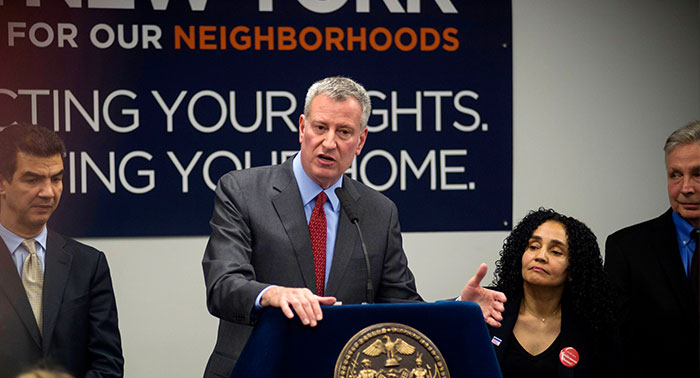Photo Courtesy of Ed Reed/Mayoral Photography Office
“Now, non-profit developers will have access to the capital required to purchase buildings and ensure their long-term affordability for over 18,000 New Yorkers,” Mayor de Blasio said.
By Forum Staff
A new program will help finance each stage of the process of acquiring and rehabilitating existing rent-stabilized and unregulated buildings to protect current tenants and preserve affordability in neighborhoods across the five boroughs, the City announced on Thursday.
The Neighborhood Pillars program aims to fund the acquisition and preservation of nearly 7,500 homes over the next eight years. According to de Blasio administration officials, this effort will be made possible by funding commitments from the Community Preservation Corporation, Wells Fargo Foundation, the City Housing Development Corporation, and the City Department of Housing Preservation and Development in coordination with the nonprofit Neighborhood Restore Housing Development Fund Corporation.
With a commitment of $2 million from Wells Fargo Foundation and $2 million from the Community Preservation Corporation, the City has established a new Down Payment Assistance Fund dedicated to pre-qualified nonprofit community-based organizations looking to purchase rent-stabilized and unregulated buildings and finance their rehabilitation and the preservation of their affordability through the new Neighborhood Pillars program, Mayor de Blasio said.
“We are using every tool available to fight the affordability crisis, and with Neighborhood Pillars, we are adding one more,” Hizzoner added. “Now, non-profit developers will have access to the capital required to purchase buildings and ensure their long-term affordability for over 18,000 New Yorkers.”
According to the City, changes in the state rent laws over the last few decades, combined with the surging demand for housing, have led to aggressive real estate speculation in rent-stabilized buildings, which provide a critical source of housing for low-income New Yorkers. Although there has been no significant net decline in rent-stabilized units over the past decade, the city has experienced a substantial decline in the number of low-cost units. Since 2014, the number of units with contract rents less than $1,500 has declined more than 12 percent or about 160,000 units.
Neighborhood Pillars, which was first announced in 2017 as part of de Blasio’s Housing New York 2.0 plan, is the latest in a series of efforts to address these issues, and both improve the quality and preserve the long-term affordability of the city’s housing stock.
Community based non-profit organizations are often well-positioned to identify the buildings most at risk of speculation and rapid turnover, City officials noted; but these organizations often lack the capital needed to make down payments and compete successfully in the acquisition market. The Neighborhood Pillars Down Payment Assistance Fund, the first of its kind, will help level the playing field by providing qualified not-for-profits with technical assistance and capital to use as a down payment or deposit on a contract to acquire properties and cover limited pre-acquisition costs, according to the administration.
“Our local nonprofits know the needs and wants of our communities better than anyone but the lack of access to capital is constant hurdle in their work, which is why the Neighborhood Pillars program is so important to preserving and improving our affordable housing stock across the City,” said Councilman Donovan Richards (D-Laurelton). “We must provide the tools to help local affordable housing organizations compete with big banks and speculators looking to benefit off of opportunities despite the community and their residents.

